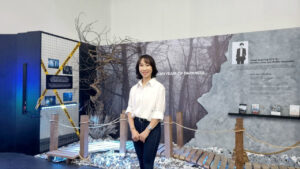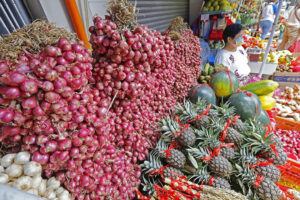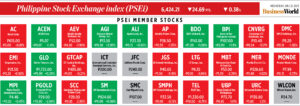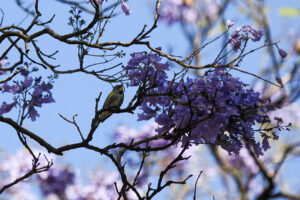Introducing ‘K-Lit:’ Youjeong Jeong in the Philippines

HALLYU (the Korean Wave) has undoubtedly swept the Philippines. The hours Filipinos spend watching K-dramas and the multiple sold-out K-pop concerts say it all. The ubiquity of Samgyup places and Korean marts are cast-iron proof.
Now the Korean Cultural Center (KCC) ups this game by introducing Korean Literature or “K-Lit” to Filipinos. They started off by bringing in one of Korea’s best-selling crime and mystery authors, Youjeong Jeong.
At a media forum held last Thursday, Ms. Jeong walked in looking like an antithesis of her thriller novels — clad in a crisp white polo shirt, face graced with a warm, radiant smile. Not what one would expect after reading her book, The Good Son, which is so vividly narrated it almost makes you smell the pungent scent of blood and bleach as you flip each page.
The Seven Years of Darkness author’s graphic familiarity with eeriness and death came from her years of experience as a nurse.
“In my 20s, I was able to work in the ER and ICU, the two places in the hospital (that) would be the closest place to death for people. Every day people would be dying,” she said in Korean through a translator. “At that point, I really developed my own world that would be used as my source in writing stories later on as a writer.”
However, it is not her only source of inspiration. Ms. Jeong adheres to a writing regimen consisting of an active lifestyle: going to the gym, running marathons, climbing mountains, doing martial arts. In fact, after one of the lowest times of her life following a cancer diagnosis and many sessions of chemotherapy, she climbed through the Himalayas for 21 days and joined a walking tour in Spain for 50.
“That’s the time I was ready to write the story again, since all my body and my heart were ragged in all the shattered pieces,” she said.
Her work has been translated into Chinese, Japanese, French, German, Thai, and Vietnamese. According to the Digital Library of Korean Literature, The Good Son was the first of her books to be translated into English (Penguin Books). Also available in English is Seven Years of Darkness (Penguin Books and Little Brown editions).
ON BEING ‘SOUTH KOREA’S STEPHEN KING’Ms. Jeong said she was inspired by literary greats like Stephen King and Ernest Hemingway.
“We know that Stephen King focused on the darkness of humanity, that evil side we have as a human. And we also have Hemmingway (who) tried to show humanity, facing death, and how humans will react while facing death,” she said.
Based on her writing portfolio, it is obvious which of the two she took the most liking to. Despite not having a formal writing education, she learned by poring over King’s novels.
“I would even transcribe actual lines from the book itself. That’s how I study. And I also look at the cause-and-effect relationship of the different cases that were tackled by Stephen King’s novels,” she said.
It is not surprising then that she has been dubbed by readers as the “Stephen King of South Korea,” but Ms. Jeong expressed that she’s keen on forging her own path.
“Recently, our readers commented that now, they can see my own color, rather than those that will be coming from Stephen King. And that it has become stronger than before,” she said.
After writing seven novels, four of which are thrillers, Ms. Jeong said that her writing focus lies particularly in humans’ free will and its relation to our “inner beast.”
“Everyone has that in our hearts, in our minds. The inner beast would suddenly come out, hiding inside, going to the outside.
“In my stories, I would focus on those people taking the wrong path, making mistakes, and how it would ruin their lives eventually,” she said.
In the page-turner The Good Son, Ms. Jeong takes readers into the mind of a psychopath whose stream of consciousness is drawn in a constant tug-of-war between lies and truth. These emerge from his mother’s murder, and, as the story unravels, his very own life. She does not condemn him nor justify his wrongdoing, only telling his story which ends in a way that is painfully real for the times we live in.
This brand of storytelling is the product of her meticulous process of planning and organization.
“Not even a fly can fly around a certain area inside my world that I’m building without my control,” she said.
THE PHILIPPINE EXPERIENCEWhile this may have been her first trip to the Philippines, but in one of her novels, she chose Cebu as the residence of the main character’s grandparents.
“We all know that the Philippines is a beautiful country… So, this paradise-like, beautiful island in the Philippines would be the best selection for that main character to elope and also dream to live the rest of their life together peacefully,” she said.
Now, however, she has more of the Philippines to take with her. The Korean novelist admitted that San Miguel beer was one of her favorite drinks. She also said that as a picky eater, she isn’t a huge fan of the fragrant and spicy flair of most Southeast Asian cuisine but found Filipino food delicious.
“I really enjoyed lechon. During one luncheon I said, ‘That lechon is all mine! Thou shall not eat!’” she said.
POP-UP EXHIBITIONAlongside Ms. Jeong’s visit, and as part of its cultural exchange initiatives focusing on Hangul (the Korean alphabet) this year, the KCC launched the “K-Lit: Turning Pages of Korea” pop-up exhibition.
“We’re just trying to break that wall first (by) introducing (Korean) literature, starting with Jeong Youjeong,” KCC Public Relations Officer Reya Buenaventura said. “K-pop and K-drama are common, but we want to dive (into literature) because it’s also part of Korean culture.”
The exhibit features Korean works from different genres that have been lauded by different award-giving bodies. Among these are Ms. Jeong’s Seven Years of Darkness and other novels like Whale by Myeongkwan Cheon and Almond by Wonpyung Son.
The exhibit is open to the public Mondays to Saturdays (excluding holidays) until Nov. 18, from 9 a.m. to 4 p.m. at the 5F Multipurpose Hall of the KCC, which is located in Taguig City. No registration is required. — Myara Janae B. Poliarco




